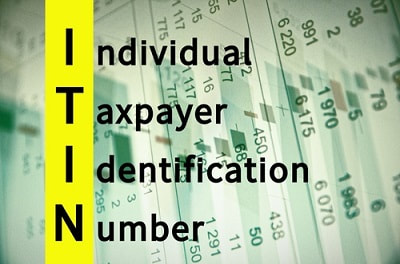What is an ITIN?
ITIN is an acronym for ‘Individual Taxpayer Identification Number’. An ITIN is a 9 digit number that always begins with a 9 that is issued by the IRS that allows individuals who are not eligible for or who don’t have a social security number to file a US tax return. Before such individuals can file their US tax return though, they need to apply for an ITIN.
It’s important to note though that ITINs don’t qualify their holders to work in the US or claim US Social Security benefits; they are simply used to file US taxes.
Who needs one?
Alongside foreigners who may need to file a US tax return (because they have US sourced income or spent enough time in the US to qualify for tax residency perhaps), there are several scenarios in which Americans may need to apply for an ITIN:
– When a US citizen or green card holder needs to apply for an ITIN for their foreign spouse, as it’s advantageous for them to file a joint US tax return.
– When a US citizen or green card holder needs to apply for an ITIN for their dependents, to enable them to claim Child Tax Credits.
– When someone who has US citizenship but has never lived in the US as an adult, including so-called Accidental Americans (born abroad to US parents), discover they need to file a US tax return.
How can expats obtain one?
“The IRS issues ITINs to individuals who are required to have a U.S. taxpayer identification number but who do not have, and are not eligible to obtain, a Social Security number” – the IRS
To obtain an ITIN from abroad, expats should attach a completed form W-7 along with the required supporting documentation (to prove their identity) to their US tax return and post it to the ITIN Operations center.
Documentation must be original or certified, as specified in the IRS W-7 instructions.
Alternatively, expats who are near one can meet with an IRS authorized Certified Acceptance Agent (CAA) who will check their documentation and return it to them before posting their completed form W-7 to the ITIN Operations center.
Completing form W-7
Form W-7 is one of the less intimidating US expat tax forms. It requests the applicants’ name, address, and birth information, along with the reason for the application. Please note that all fields must be completed for the form to be accepted, so if a field isn’t relevant expats must still write ‘n/a’ in it.
Filing US taxes from abroad
All American citizens and green card holders are required to file a US tax return and declare their worldwide income, wherever in the world they live, and including dual citizens and anyone with the right to US citizenship, even if they’ve never had a US passport. There are several IRS exemptions that allow expats to expats to avoid double taxation on the same income, while expats who didn’t know that they had to file US taxes can catch up without facing penalties using an IRS amnesty program called the Streamlined Procedure. Expats may also have to file an FBAR to report their foreign bank and investment accounts.

 Connect on LinkedIn
Connect on LinkedIn

